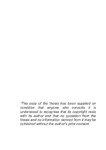SAUDI EQUITIES HERDING: THE ROLE OF REGIONAL AND GLOBAL FACTORS
| dc.contributor.supervisor | VIRK, NADER | |
| dc.contributor.author | GABBORI, DINA | |
| dc.contributor.other | Plymouth Business School | en_US |
| dc.date.accessioned | 2020-07-03T12:05:32Z | |
| dc.date.available | 2020-07-03T12:05:32Z | |
| dc.date.issued | 2020 | |
| dc.identifier | 10464899 | en_US |
| dc.identifier.uri | http://hdl.handle.net/10026.1/15835 | |
| dc.description.abstract |
Herding is an important stock market behaviour for investors and policymakers, it may affect market volatility, which investors need to understand to properly assess risks. Financial instability may deter risk-averse investors while benefitting investors seeking profit from market inefficiencies. Policymakers who understand herding impacts are better placed to improve the information available to investors. Herding behaviour in the Saudi equity market was examined between 2006 and 2016 using the method suggested by Change et al. (2000), from three related perspectives. Firstly, through its influence on oil market volatility, including during OPEC conference meetings. Results showed significant herding behaviour in most sub-periods. However, cascading was independent of oil market volatility, except during OPEC meetings in the global financial crisis period, 2008 - 2010. Secondly, through the impacts of social attitudes coinciding with Islamic festivals of Ramadan, Eid-ul-Fitr, Ashoura and Eid-ul-Adha. Up- and down-days for both markets and liquidity were considered in domestic and the influential US and oil markets, using appropriate vectors. Movements pre and post the 2008 Global Financial Crisis and the Arab Spring in 2010 were separately assessed. Results showed significant herding during Eid-ul-Fitar, Ashoura and Eid-ul-Adha, but, contrary to some studies, none during Ramadan. Thirdly, through its effects on regionally and culturally adjacent equity markets, particularly in GCC countries, with information spill-over from the US a factor. Results showed pronounced herding in all GCC equity markets affected by significant herding spilled-over from the Saudi market and insignificant spill-over from the US; indicating regional integration of markets with Saudi pre-eminent. Several findings are novel, including the impacts of Islamic festivals, other than Ramadan and oil price volatility during OPEC meetings, on herding behaviour: both have been largely ignored in most previous studies. Our results provide valuable insights, showing that herding and excess volatility recently observed in the Saudi equity market is not related to risk or information spill-over from oil markets. | en_US |
| dc.description.sponsorship | STUDENTSHIP FROM THE SAUDI GOVERNMENT | en_US |
| dc.language.iso | en | |
| dc.publisher | University of Plymouth | |
| dc.subject | Herding Behaviour | en_US |
| dc.subject | GCC Countries | |
| dc.subject | OPEC Meetings | |
| dc.subject | Islamic Events | |
| dc.subject | Herding Spill-over | |
| dc.subject.classification | PhD | en_US |
| dc.title | SAUDI EQUITIES HERDING: THE ROLE OF REGIONAL AND GLOBAL FACTORS | en_US |
| dc.type | Thesis | |
| plymouth.version | publishable | en_US |
| dc.identifier.doi | http://dx.doi.org/10.24382/979 | |
| dc.identifier.doi | http://dx.doi.org/10.24382/979 | |
| dc.rights.embargoperiod | No embargo | en_US |
| dc.type.qualification | Doctorate | en_US |
| rioxxterms.version | NA |
Files in this item
This item appears in the following Collection(s)
-
01 Research Theses Main Collection
Research Theses Main


